Poor Guest Satisfaction in Imperial Hotel: An Analysis and Recommendations
VerifiedAdded on 2023/04/22
|14
|3770
|271
AI Summary
This report analyzes the problem of poor guest satisfaction in Imperial Hotel and provides recommendations to address the issue effectively. It includes an analysis of the issues, ways of addressing complaints of guests, and alternative ways to address the issue.
Contribute Materials
Your contribution can guide someone’s learning journey. Share your
documents today.
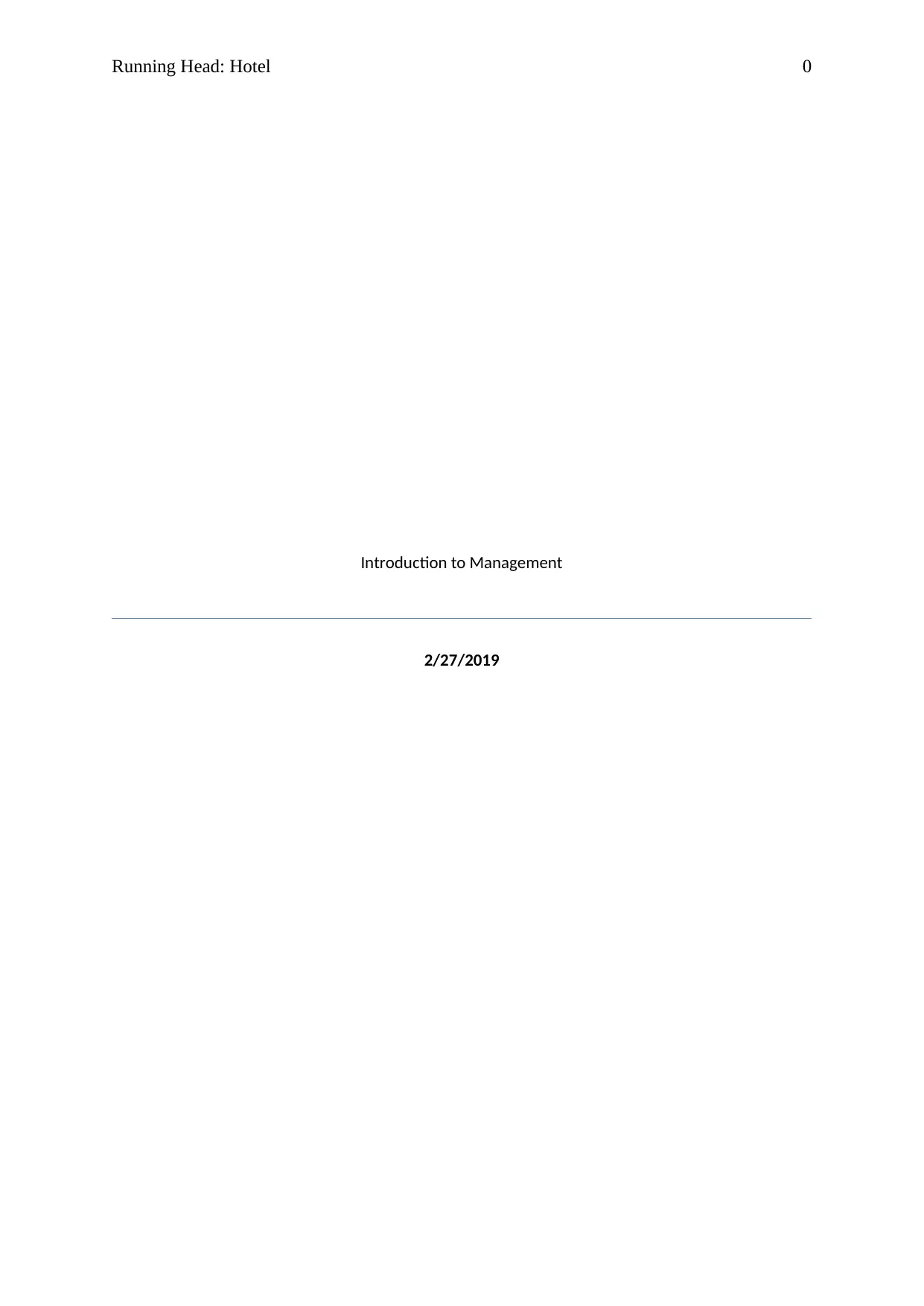
Running Head: Hotel 0
Introduction to Management
2/27/2019
Introduction to Management
2/27/2019
Secure Best Marks with AI Grader
Need help grading? Try our AI Grader for instant feedback on your assignments.
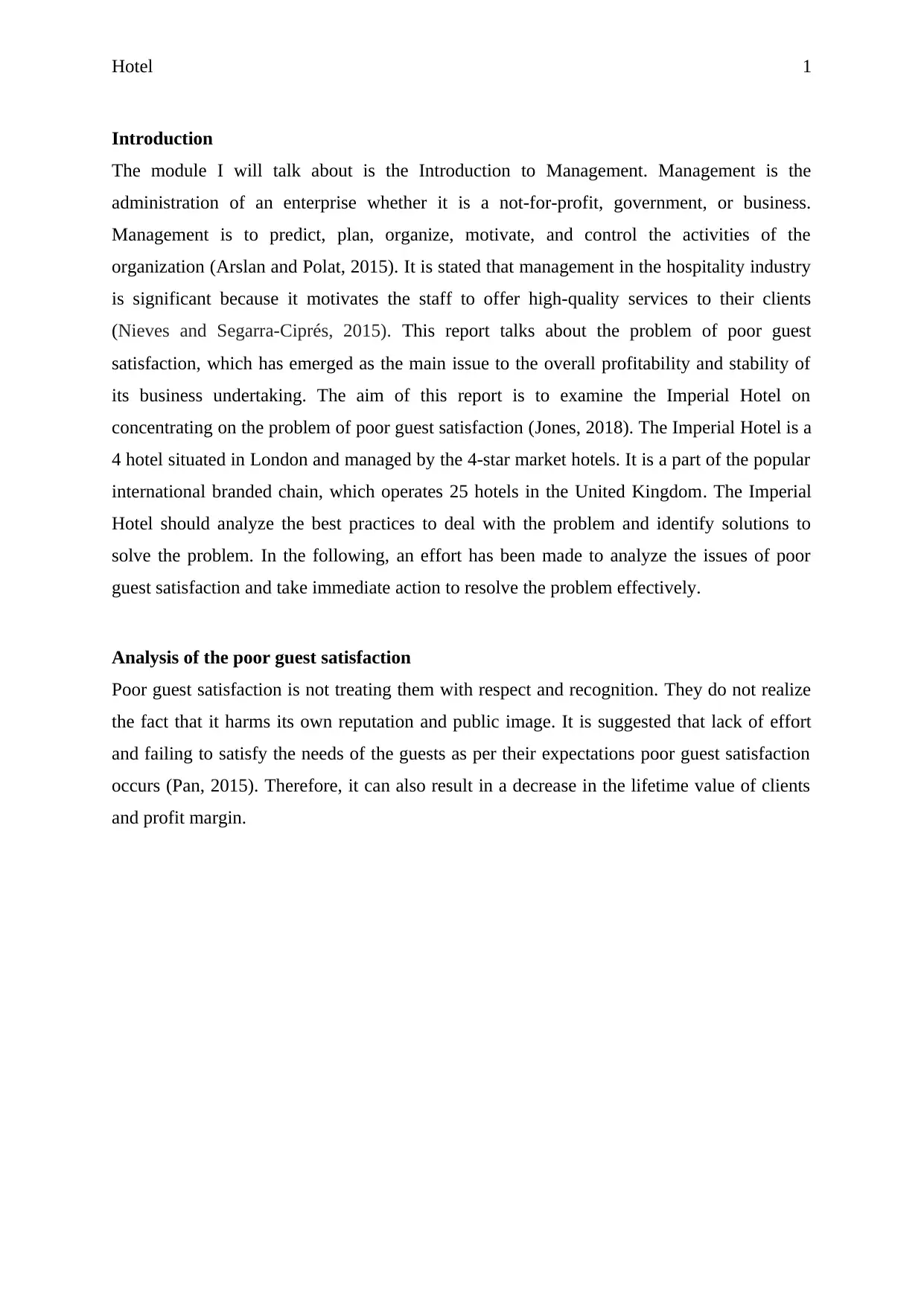
Hotel 1
Introduction
The module I will talk about is the Introduction to Management. Management is the
administration of an enterprise whether it is a not-for-profit, government, or business.
Management is to predict, plan, organize, motivate, and control the activities of the
organization (Arslan and Polat, 2015). It is stated that management in the hospitality industry
is significant because it motivates the staff to offer high-quality services to their clients
(Nieves and Segarra-Ciprés, 2015). This report talks about the problem of poor guest
satisfaction, which has emerged as the main issue to the overall profitability and stability of
its business undertaking. The aim of this report is to examine the Imperial Hotel on
concentrating on the problem of poor guest satisfaction (Jones, 2018). The Imperial Hotel is a
4 hotel situated in London and managed by the 4-star market hotels. It is a part of the popular
international branded chain, which operates 25 hotels in the United Kingdom. The Imperial
Hotel should analyze the best practices to deal with the problem and identify solutions to
solve the problem. In the following, an effort has been made to analyze the issues of poor
guest satisfaction and take immediate action to resolve the problem effectively.
Analysis of the poor guest satisfaction
Poor guest satisfaction is not treating them with respect and recognition. They do not realize
the fact that it harms its own reputation and public image. It is suggested that lack of effort
and failing to satisfy the needs of the guests as per their expectations poor guest satisfaction
occurs (Pan, 2015). Therefore, it can also result in a decrease in the lifetime value of clients
and profit margin.
Introduction
The module I will talk about is the Introduction to Management. Management is the
administration of an enterprise whether it is a not-for-profit, government, or business.
Management is to predict, plan, organize, motivate, and control the activities of the
organization (Arslan and Polat, 2015). It is stated that management in the hospitality industry
is significant because it motivates the staff to offer high-quality services to their clients
(Nieves and Segarra-Ciprés, 2015). This report talks about the problem of poor guest
satisfaction, which has emerged as the main issue to the overall profitability and stability of
its business undertaking. The aim of this report is to examine the Imperial Hotel on
concentrating on the problem of poor guest satisfaction (Jones, 2018). The Imperial Hotel is a
4 hotel situated in London and managed by the 4-star market hotels. It is a part of the popular
international branded chain, which operates 25 hotels in the United Kingdom. The Imperial
Hotel should analyze the best practices to deal with the problem and identify solutions to
solve the problem. In the following, an effort has been made to analyze the issues of poor
guest satisfaction and take immediate action to resolve the problem effectively.
Analysis of the poor guest satisfaction
Poor guest satisfaction is not treating them with respect and recognition. They do not realize
the fact that it harms its own reputation and public image. It is suggested that lack of effort
and failing to satisfy the needs of the guests as per their expectations poor guest satisfaction
occurs (Pan, 2015). Therefore, it can also result in a decrease in the lifetime value of clients
and profit margin.
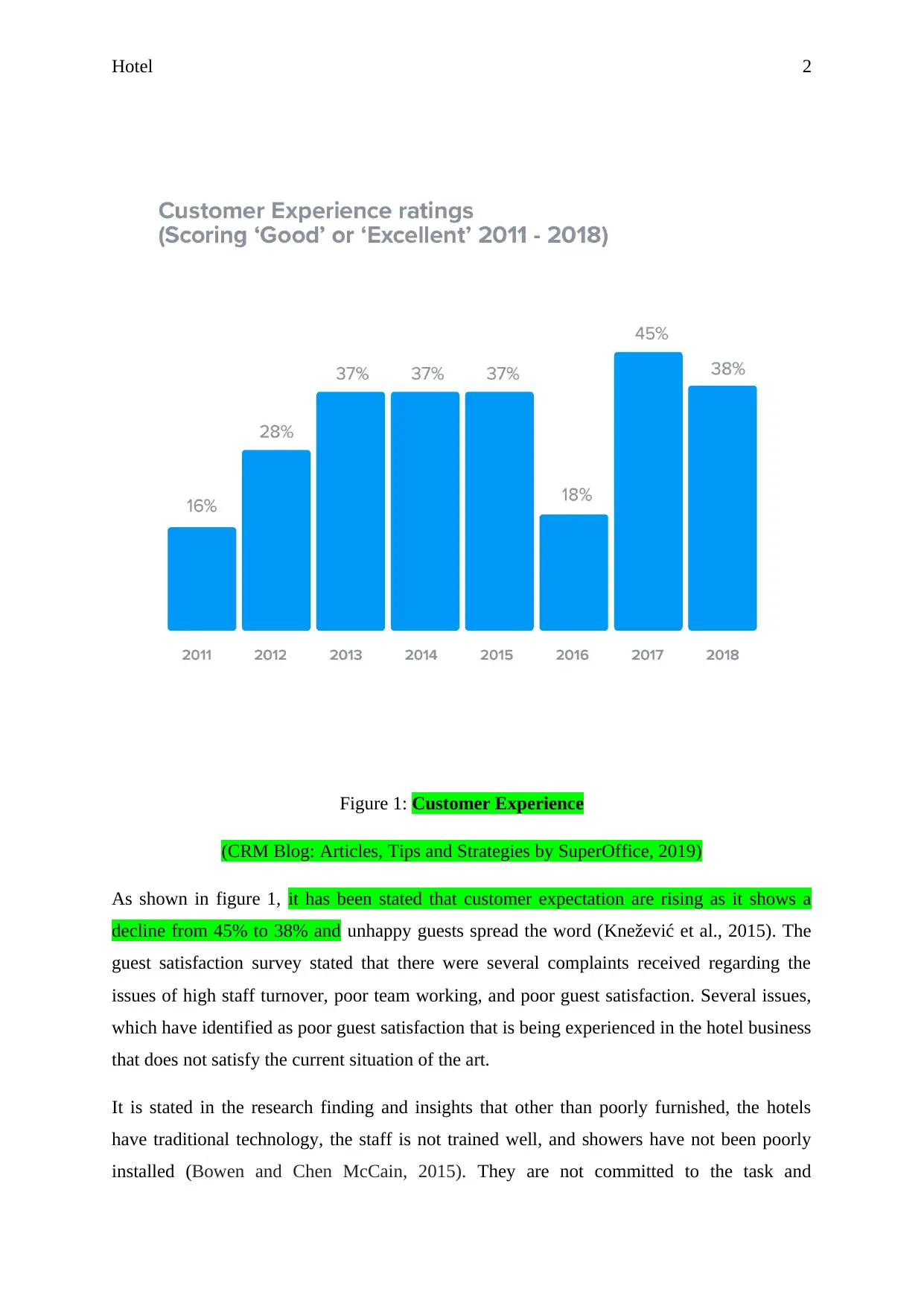
Hotel 2
Figure 1: Customer Experience
(CRM Blog: Articles, Tips and Strategies by SuperOffice, 2019)
As shown in figure 1, it has been stated that customer expectation are rising as it shows a
decline from 45% to 38% and unhappy guests spread the word (Knežević et al., 2015). The
guest satisfaction survey stated that there were several complaints received regarding the
issues of high staff turnover, poor team working, and poor guest satisfaction. Several issues,
which have identified as poor guest satisfaction that is being experienced in the hotel business
that does not satisfy the current situation of the art.
It is stated in the research finding and insights that other than poorly furnished, the hotels
have traditional technology, the staff is not trained well, and showers have not been poorly
installed (Bowen and Chen McCain, 2015). They are not committed to the task and
Figure 1: Customer Experience
(CRM Blog: Articles, Tips and Strategies by SuperOffice, 2019)
As shown in figure 1, it has been stated that customer expectation are rising as it shows a
decline from 45% to 38% and unhappy guests spread the word (Knežević et al., 2015). The
guest satisfaction survey stated that there were several complaints received regarding the
issues of high staff turnover, poor team working, and poor guest satisfaction. Several issues,
which have identified as poor guest satisfaction that is being experienced in the hotel business
that does not satisfy the current situation of the art.
It is stated in the research finding and insights that other than poorly furnished, the hotels
have traditional technology, the staff is not trained well, and showers have not been poorly
installed (Bowen and Chen McCain, 2015). They are not committed to the task and
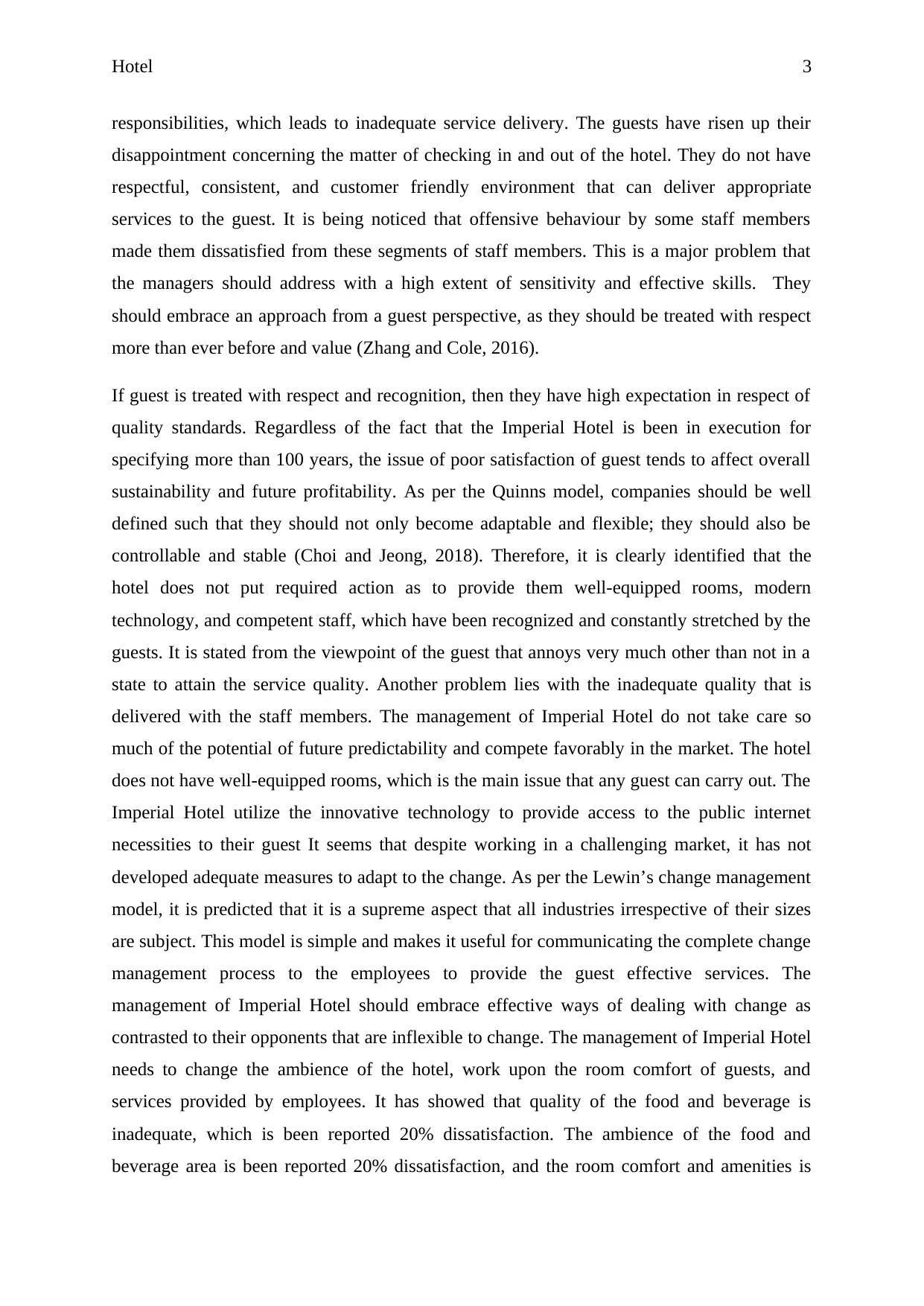
Hotel 3
responsibilities, which leads to inadequate service delivery. The guests have risen up their
disappointment concerning the matter of checking in and out of the hotel. They do not have
respectful, consistent, and customer friendly environment that can deliver appropriate
services to the guest. It is being noticed that offensive behaviour by some staff members
made them dissatisfied from these segments of staff members. This is a major problem that
the managers should address with a high extent of sensitivity and effective skills. They
should embrace an approach from a guest perspective, as they should be treated with respect
more than ever before and value (Zhang and Cole, 2016).
If guest is treated with respect and recognition, then they have high expectation in respect of
quality standards. Regardless of the fact that the Imperial Hotel is been in execution for
specifying more than 100 years, the issue of poor satisfaction of guest tends to affect overall
sustainability and future profitability. As per the Quinns model, companies should be well
defined such that they should not only become adaptable and flexible; they should also be
controllable and stable (Choi and Jeong, 2018). Therefore, it is clearly identified that the
hotel does not put required action as to provide them well-equipped rooms, modern
technology, and competent staff, which have been recognized and constantly stretched by the
guests. It is stated from the viewpoint of the guest that annoys very much other than not in a
state to attain the service quality. Another problem lies with the inadequate quality that is
delivered with the staff members. The management of Imperial Hotel do not take care so
much of the potential of future predictability and compete favorably in the market. The hotel
does not have well-equipped rooms, which is the main issue that any guest can carry out. The
Imperial Hotel utilize the innovative technology to provide access to the public internet
necessities to their guest It seems that despite working in a challenging market, it has not
developed adequate measures to adapt to the change. As per the Lewin’s change management
model, it is predicted that it is a supreme aspect that all industries irrespective of their sizes
are subject. This model is simple and makes it useful for communicating the complete change
management process to the employees to provide the guest effective services. The
management of Imperial Hotel should embrace effective ways of dealing with change as
contrasted to their opponents that are inflexible to change. The management of Imperial Hotel
needs to change the ambience of the hotel, work upon the room comfort of guests, and
services provided by employees. It has showed that quality of the food and beverage is
inadequate, which is been reported 20% dissatisfaction. The ambience of the food and
beverage area is been reported 20% dissatisfaction, and the room comfort and amenities is
responsibilities, which leads to inadequate service delivery. The guests have risen up their
disappointment concerning the matter of checking in and out of the hotel. They do not have
respectful, consistent, and customer friendly environment that can deliver appropriate
services to the guest. It is being noticed that offensive behaviour by some staff members
made them dissatisfied from these segments of staff members. This is a major problem that
the managers should address with a high extent of sensitivity and effective skills. They
should embrace an approach from a guest perspective, as they should be treated with respect
more than ever before and value (Zhang and Cole, 2016).
If guest is treated with respect and recognition, then they have high expectation in respect of
quality standards. Regardless of the fact that the Imperial Hotel is been in execution for
specifying more than 100 years, the issue of poor satisfaction of guest tends to affect overall
sustainability and future profitability. As per the Quinns model, companies should be well
defined such that they should not only become adaptable and flexible; they should also be
controllable and stable (Choi and Jeong, 2018). Therefore, it is clearly identified that the
hotel does not put required action as to provide them well-equipped rooms, modern
technology, and competent staff, which have been recognized and constantly stretched by the
guests. It is stated from the viewpoint of the guest that annoys very much other than not in a
state to attain the service quality. Another problem lies with the inadequate quality that is
delivered with the staff members. The management of Imperial Hotel do not take care so
much of the potential of future predictability and compete favorably in the market. The hotel
does not have well-equipped rooms, which is the main issue that any guest can carry out. The
Imperial Hotel utilize the innovative technology to provide access to the public internet
necessities to their guest It seems that despite working in a challenging market, it has not
developed adequate measures to adapt to the change. As per the Lewin’s change management
model, it is predicted that it is a supreme aspect that all industries irrespective of their sizes
are subject. This model is simple and makes it useful for communicating the complete change
management process to the employees to provide the guest effective services. The
management of Imperial Hotel should embrace effective ways of dealing with change as
contrasted to their opponents that are inflexible to change. The management of Imperial Hotel
needs to change the ambience of the hotel, work upon the room comfort of guests, and
services provided by employees. It has showed that quality of the food and beverage is
inadequate, which is been reported 20% dissatisfaction. The ambience of the food and
beverage area is been reported 20% dissatisfaction, and the room comfort and amenities is
Secure Best Marks with AI Grader
Need help grading? Try our AI Grader for instant feedback on your assignments.
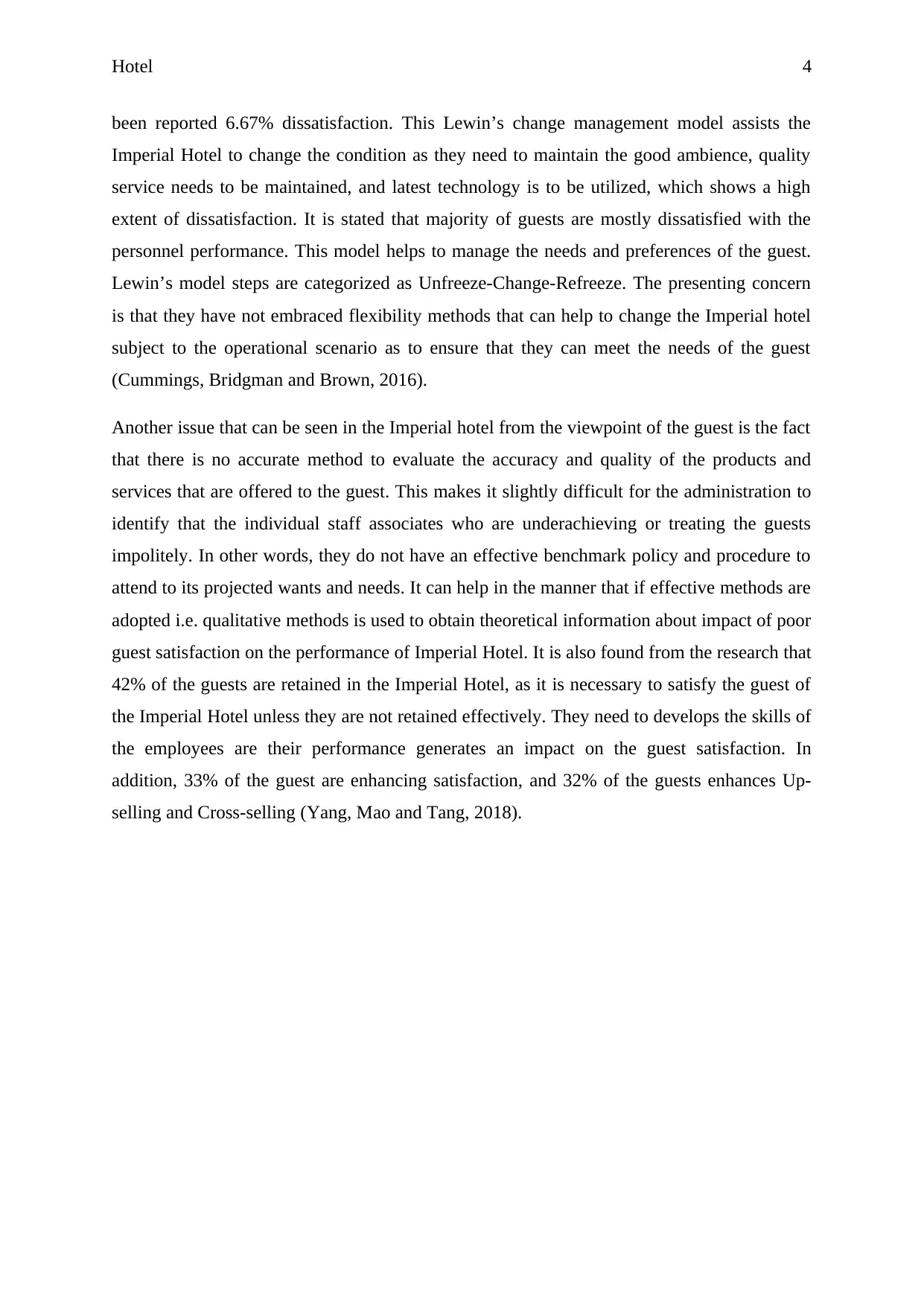
Hotel 4
been reported 6.67% dissatisfaction. This Lewin’s change management model assists the
Imperial Hotel to change the condition as they need to maintain the good ambience, quality
service needs to be maintained, and latest technology is to be utilized, which shows a high
extent of dissatisfaction. It is stated that majority of guests are mostly dissatisfied with the
personnel performance. This model helps to manage the needs and preferences of the guest.
Lewin’s model steps are categorized as Unfreeze-Change-Refreeze. The presenting concern
is that they have not embraced flexibility methods that can help to change the Imperial hotel
subject to the operational scenario as to ensure that they can meet the needs of the guest
(Cummings, Bridgman and Brown, 2016).
Another issue that can be seen in the Imperial hotel from the viewpoint of the guest is the fact
that there is no accurate method to evaluate the accuracy and quality of the products and
services that are offered to the guest. This makes it slightly difficult for the administration to
identify that the individual staff associates who are underachieving or treating the guests
impolitely. In other words, they do not have an effective benchmark policy and procedure to
attend to its projected wants and needs. It can help in the manner that if effective methods are
adopted i.e. qualitative methods is used to obtain theoretical information about impact of poor
guest satisfaction on the performance of Imperial Hotel. It is also found from the research that
42% of the guests are retained in the Imperial Hotel, as it is necessary to satisfy the guest of
the Imperial Hotel unless they are not retained effectively. They need to develops the skills of
the employees are their performance generates an impact on the guest satisfaction. In
addition, 33% of the guest are enhancing satisfaction, and 32% of the guests enhances Up-
selling and Cross-selling (Yang, Mao and Tang, 2018).
been reported 6.67% dissatisfaction. This Lewin’s change management model assists the
Imperial Hotel to change the condition as they need to maintain the good ambience, quality
service needs to be maintained, and latest technology is to be utilized, which shows a high
extent of dissatisfaction. It is stated that majority of guests are mostly dissatisfied with the
personnel performance. This model helps to manage the needs and preferences of the guest.
Lewin’s model steps are categorized as Unfreeze-Change-Refreeze. The presenting concern
is that they have not embraced flexibility methods that can help to change the Imperial hotel
subject to the operational scenario as to ensure that they can meet the needs of the guest
(Cummings, Bridgman and Brown, 2016).
Another issue that can be seen in the Imperial hotel from the viewpoint of the guest is the fact
that there is no accurate method to evaluate the accuracy and quality of the products and
services that are offered to the guest. This makes it slightly difficult for the administration to
identify that the individual staff associates who are underachieving or treating the guests
impolitely. In other words, they do not have an effective benchmark policy and procedure to
attend to its projected wants and needs. It can help in the manner that if effective methods are
adopted i.e. qualitative methods is used to obtain theoretical information about impact of poor
guest satisfaction on the performance of Imperial Hotel. It is also found from the research that
42% of the guests are retained in the Imperial Hotel, as it is necessary to satisfy the guest of
the Imperial Hotel unless they are not retained effectively. They need to develops the skills of
the employees are their performance generates an impact on the guest satisfaction. In
addition, 33% of the guest are enhancing satisfaction, and 32% of the guests enhances Up-
selling and Cross-selling (Yang, Mao and Tang, 2018).
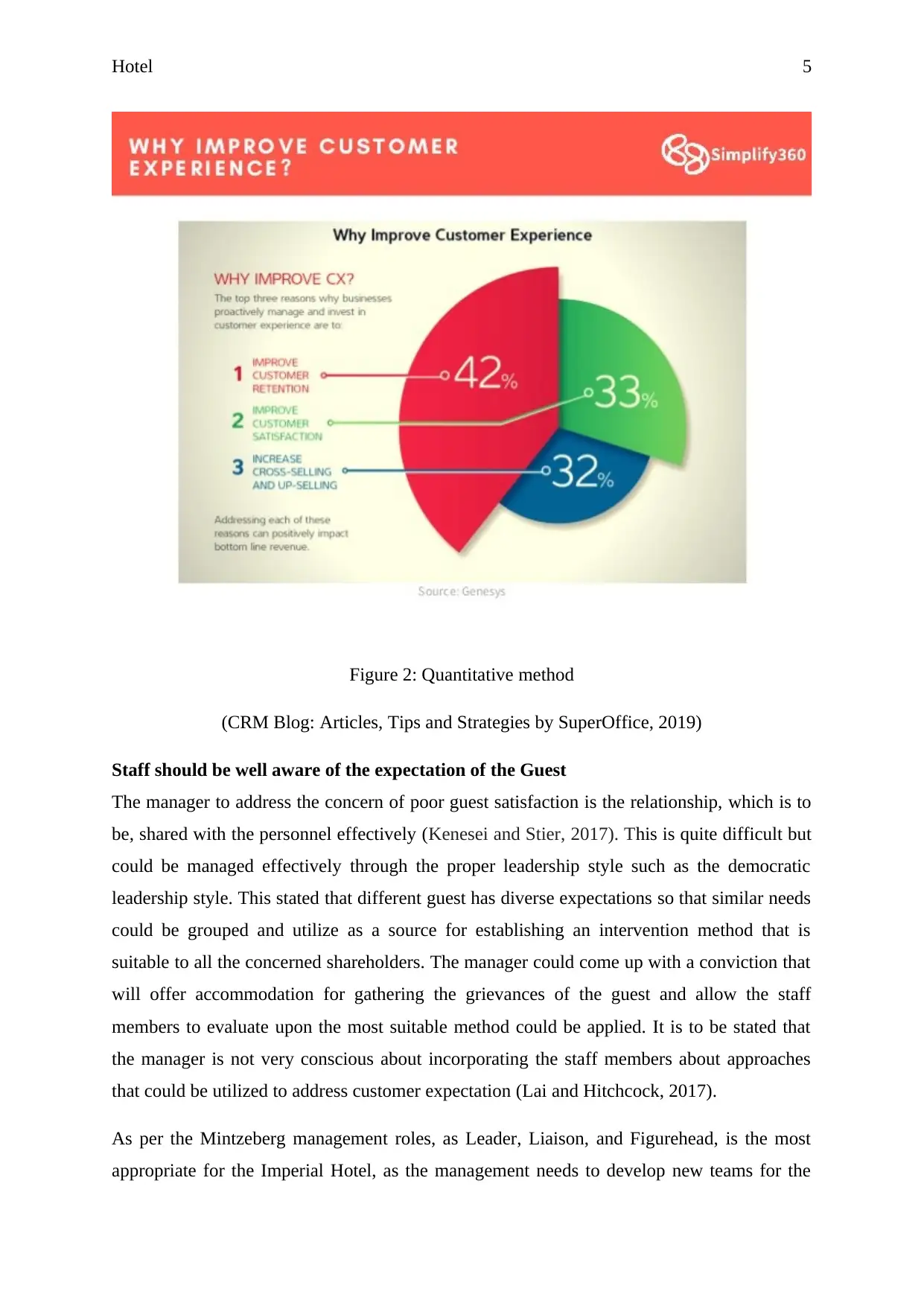
Hotel 5
Figure 2: Quantitative method
(CRM Blog: Articles, Tips and Strategies by SuperOffice, 2019)
Staff should be well aware of the expectation of the Guest
The manager to address the concern of poor guest satisfaction is the relationship, which is to
be, shared with the personnel effectively (Kenesei and Stier, 2017). This is quite difficult but
could be managed effectively through the proper leadership style such as the democratic
leadership style. This stated that different guest has diverse expectations so that similar needs
could be grouped and utilize as a source for establishing an intervention method that is
suitable to all the concerned shareholders. The manager could come up with a conviction that
will offer accommodation for gathering the grievances of the guest and allow the staff
members to evaluate upon the most suitable method could be applied. It is to be stated that
the manager is not very conscious about incorporating the staff members about approaches
that could be utilized to address customer expectation (Lai and Hitchcock, 2017).
As per the Mintzeberg management roles, as Leader, Liaison, and Figurehead, is the most
appropriate for the Imperial Hotel, as the management needs to develop new teams for the
Figure 2: Quantitative method
(CRM Blog: Articles, Tips and Strategies by SuperOffice, 2019)
Staff should be well aware of the expectation of the Guest
The manager to address the concern of poor guest satisfaction is the relationship, which is to
be, shared with the personnel effectively (Kenesei and Stier, 2017). This is quite difficult but
could be managed effectively through the proper leadership style such as the democratic
leadership style. This stated that different guest has diverse expectations so that similar needs
could be grouped and utilize as a source for establishing an intervention method that is
suitable to all the concerned shareholders. The manager could come up with a conviction that
will offer accommodation for gathering the grievances of the guest and allow the staff
members to evaluate upon the most suitable method could be applied. It is to be stated that
the manager is not very conscious about incorporating the staff members about approaches
that could be utilized to address customer expectation (Lai and Hitchcock, 2017).
As per the Mintzeberg management roles, as Leader, Liaison, and Figurehead, is the most
appropriate for the Imperial Hotel, as the management needs to develop new teams for the
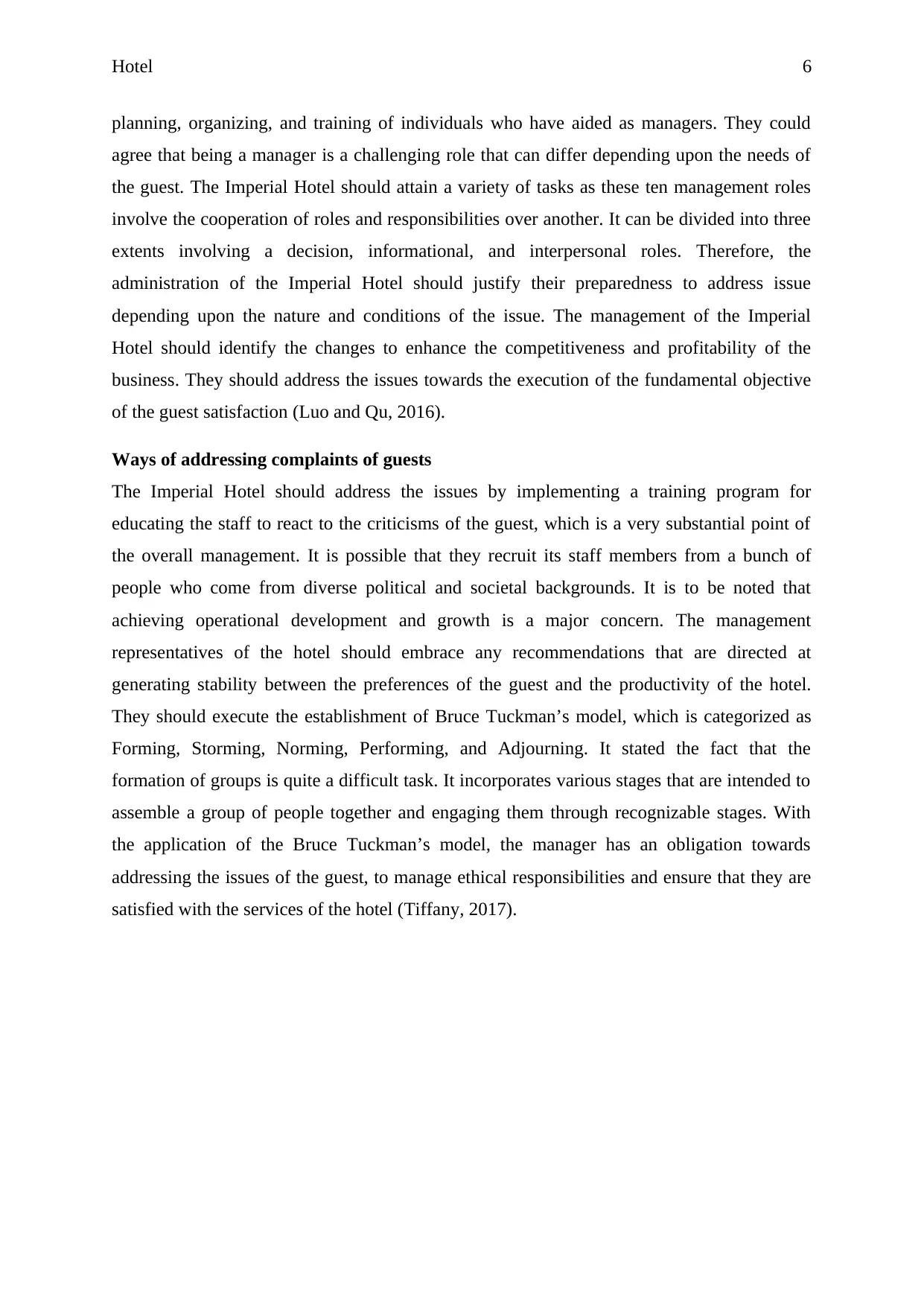
Hotel 6
planning, organizing, and training of individuals who have aided as managers. They could
agree that being a manager is a challenging role that can differ depending upon the needs of
the guest. The Imperial Hotel should attain a variety of tasks as these ten management roles
involve the cooperation of roles and responsibilities over another. It can be divided into three
extents involving a decision, informational, and interpersonal roles. Therefore, the
administration of the Imperial Hotel should justify their preparedness to address issue
depending upon the nature and conditions of the issue. The management of the Imperial
Hotel should identify the changes to enhance the competitiveness and profitability of the
business. They should address the issues towards the execution of the fundamental objective
of the guest satisfaction (Luo and Qu, 2016).
Ways of addressing complaints of guests
The Imperial Hotel should address the issues by implementing a training program for
educating the staff to react to the criticisms of the guest, which is a very substantial point of
the overall management. It is possible that they recruit its staff members from a bunch of
people who come from diverse political and societal backgrounds. It is to be noted that
achieving operational development and growth is a major concern. The management
representatives of the hotel should embrace any recommendations that are directed at
generating stability between the preferences of the guest and the productivity of the hotel.
They should execute the establishment of Bruce Tuckman’s model, which is categorized as
Forming, Storming, Norming, Performing, and Adjourning. It stated the fact that the
formation of groups is quite a difficult task. It incorporates various stages that are intended to
assemble a group of people together and engaging them through recognizable stages. With
the application of the Bruce Tuckman’s model, the manager has an obligation towards
addressing the issues of the guest, to manage ethical responsibilities and ensure that they are
satisfied with the services of the hotel (Tiffany, 2017).
planning, organizing, and training of individuals who have aided as managers. They could
agree that being a manager is a challenging role that can differ depending upon the needs of
the guest. The Imperial Hotel should attain a variety of tasks as these ten management roles
involve the cooperation of roles and responsibilities over another. It can be divided into three
extents involving a decision, informational, and interpersonal roles. Therefore, the
administration of the Imperial Hotel should justify their preparedness to address issue
depending upon the nature and conditions of the issue. The management of the Imperial
Hotel should identify the changes to enhance the competitiveness and profitability of the
business. They should address the issues towards the execution of the fundamental objective
of the guest satisfaction (Luo and Qu, 2016).
Ways of addressing complaints of guests
The Imperial Hotel should address the issues by implementing a training program for
educating the staff to react to the criticisms of the guest, which is a very substantial point of
the overall management. It is possible that they recruit its staff members from a bunch of
people who come from diverse political and societal backgrounds. It is to be noted that
achieving operational development and growth is a major concern. The management
representatives of the hotel should embrace any recommendations that are directed at
generating stability between the preferences of the guest and the productivity of the hotel.
They should execute the establishment of Bruce Tuckman’s model, which is categorized as
Forming, Storming, Norming, Performing, and Adjourning. It stated the fact that the
formation of groups is quite a difficult task. It incorporates various stages that are intended to
assemble a group of people together and engaging them through recognizable stages. With
the application of the Bruce Tuckman’s model, the manager has an obligation towards
addressing the issues of the guest, to manage ethical responsibilities and ensure that they are
satisfied with the services of the hotel (Tiffany, 2017).
Paraphrase This Document
Need a fresh take? Get an instant paraphrase of this document with our AI Paraphraser
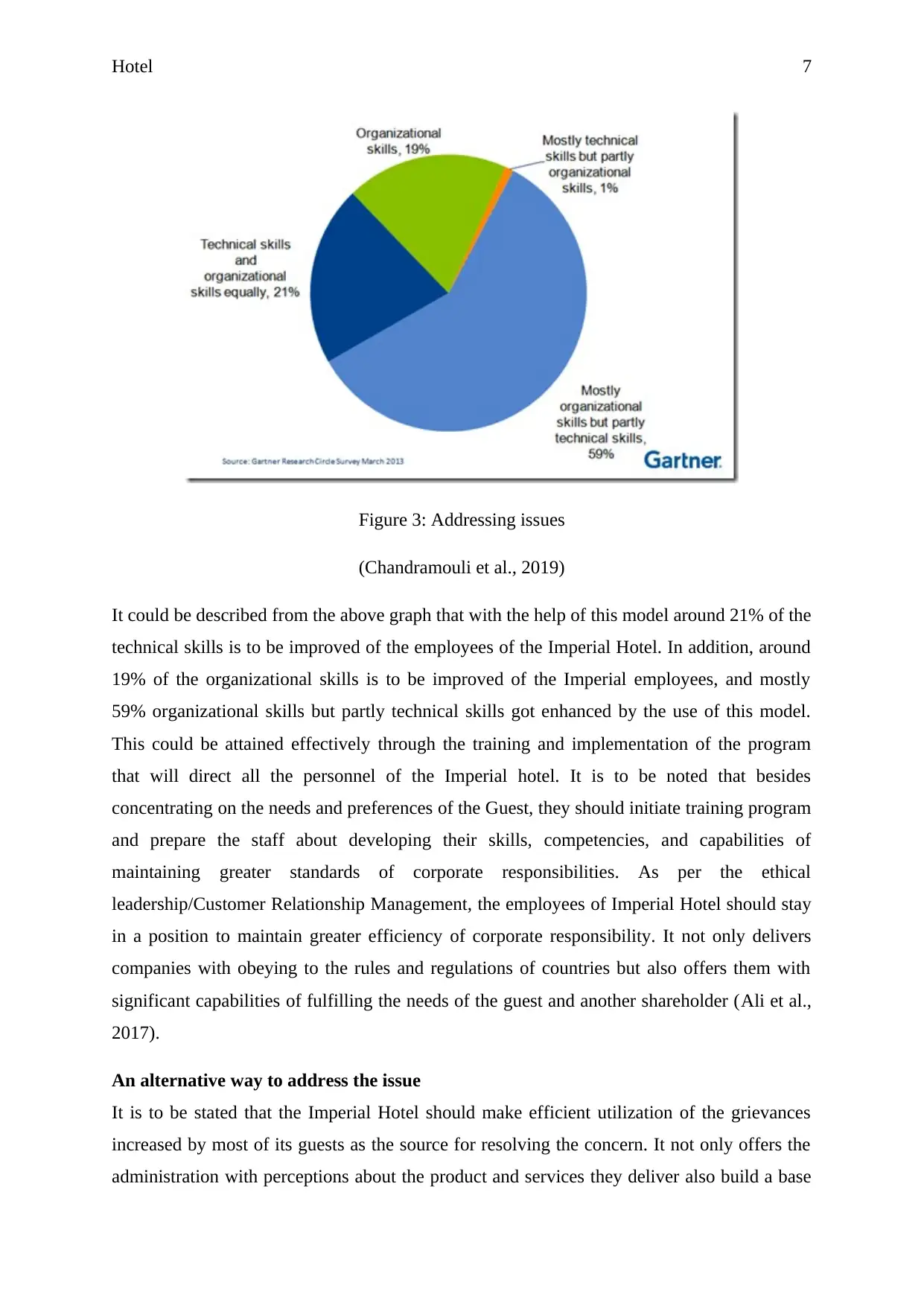
Hotel 7
Figure 3: Addressing issues
(Chandramouli et al., 2019)
It could be described from the above graph that with the help of this model around 21% of the
technical skills is to be improved of the employees of the Imperial Hotel. In addition, around
19% of the organizational skills is to be improved of the Imperial employees, and mostly
59% organizational skills but partly technical skills got enhanced by the use of this model.
This could be attained effectively through the training and implementation of the program
that will direct all the personnel of the Imperial hotel. It is to be noted that besides
concentrating on the needs and preferences of the Guest, they should initiate training program
and prepare the staff about developing their skills, competencies, and capabilities of
maintaining greater standards of corporate responsibilities. As per the ethical
leadership/Customer Relationship Management, the employees of Imperial Hotel should stay
in a position to maintain greater efficiency of corporate responsibility. It not only delivers
companies with obeying to the rules and regulations of countries but also offers them with
significant capabilities of fulfilling the needs of the guest and another shareholder (Ali et al.,
2017).
An alternative way to address the issue
It is to be stated that the Imperial Hotel should make efficient utilization of the grievances
increased by most of its guests as the source for resolving the concern. It not only offers the
administration with perceptions about the product and services they deliver also build a base
Figure 3: Addressing issues
(Chandramouli et al., 2019)
It could be described from the above graph that with the help of this model around 21% of the
technical skills is to be improved of the employees of the Imperial Hotel. In addition, around
19% of the organizational skills is to be improved of the Imperial employees, and mostly
59% organizational skills but partly technical skills got enhanced by the use of this model.
This could be attained effectively through the training and implementation of the program
that will direct all the personnel of the Imperial hotel. It is to be noted that besides
concentrating on the needs and preferences of the Guest, they should initiate training program
and prepare the staff about developing their skills, competencies, and capabilities of
maintaining greater standards of corporate responsibilities. As per the ethical
leadership/Customer Relationship Management, the employees of Imperial Hotel should stay
in a position to maintain greater efficiency of corporate responsibility. It not only delivers
companies with obeying to the rules and regulations of countries but also offers them with
significant capabilities of fulfilling the needs of the guest and another shareholder (Ali et al.,
2017).
An alternative way to address the issue
It is to be stated that the Imperial Hotel should make efficient utilization of the grievances
increased by most of its guests as the source for resolving the concern. It not only offers the
administration with perceptions about the product and services they deliver also build a base
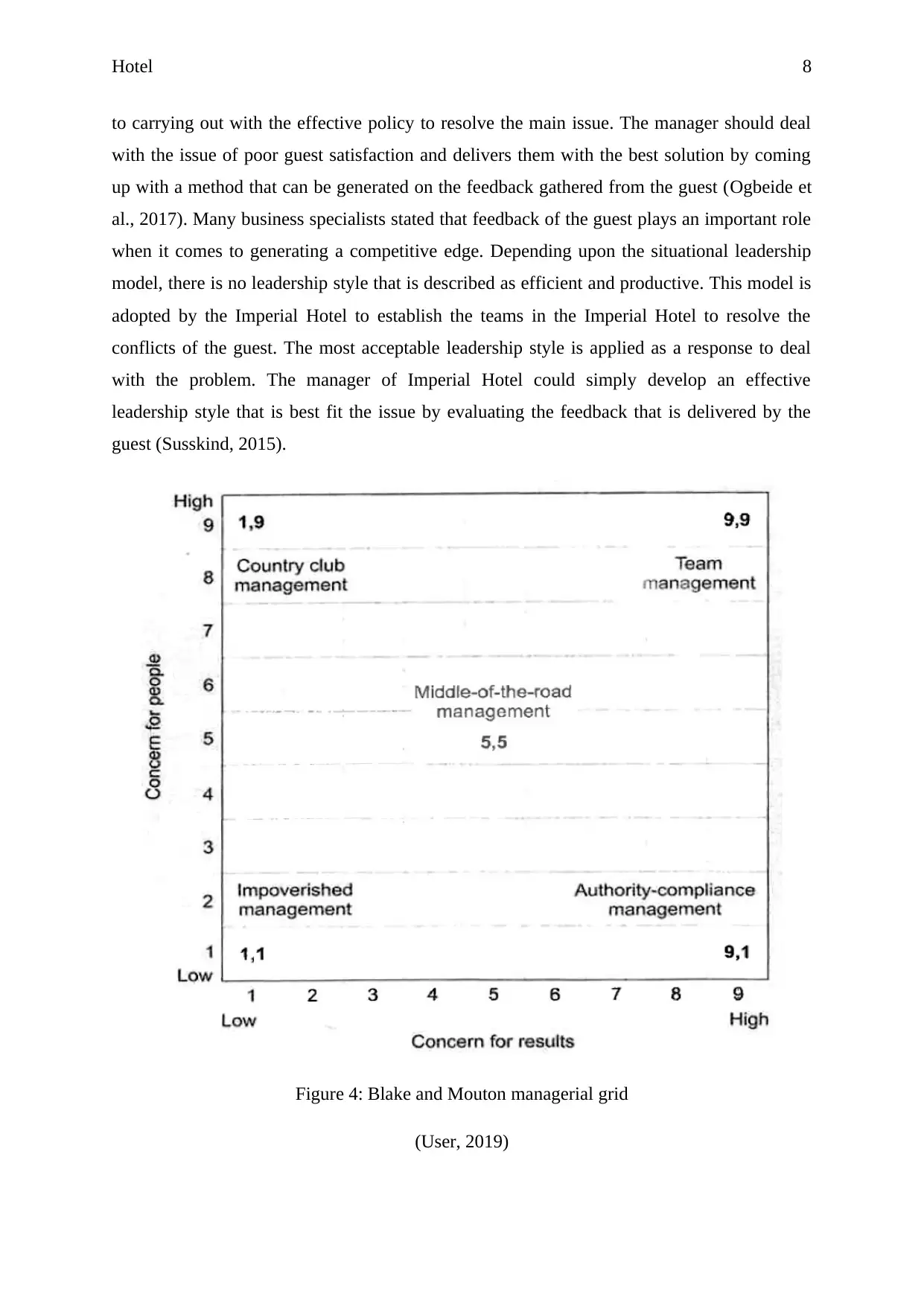
Hotel 8
to carrying out with the effective policy to resolve the main issue. The manager should deal
with the issue of poor guest satisfaction and delivers them with the best solution by coming
up with a method that can be generated on the feedback gathered from the guest (Ogbeide et
al., 2017). Many business specialists stated that feedback of the guest plays an important role
when it comes to generating a competitive edge. Depending upon the situational leadership
model, there is no leadership style that is described as efficient and productive. This model is
adopted by the Imperial Hotel to establish the teams in the Imperial Hotel to resolve the
conflicts of the guest. The most acceptable leadership style is applied as a response to deal
with the problem. The manager of Imperial Hotel could simply develop an effective
leadership style that is best fit the issue by evaluating the feedback that is delivered by the
guest (Susskind, 2015).
Figure 4: Blake and Mouton managerial grid
(User, 2019)
to carrying out with the effective policy to resolve the main issue. The manager should deal
with the issue of poor guest satisfaction and delivers them with the best solution by coming
up with a method that can be generated on the feedback gathered from the guest (Ogbeide et
al., 2017). Many business specialists stated that feedback of the guest plays an important role
when it comes to generating a competitive edge. Depending upon the situational leadership
model, there is no leadership style that is described as efficient and productive. This model is
adopted by the Imperial Hotel to establish the teams in the Imperial Hotel to resolve the
conflicts of the guest. The most acceptable leadership style is applied as a response to deal
with the problem. The manager of Imperial Hotel could simply develop an effective
leadership style that is best fit the issue by evaluating the feedback that is delivered by the
guest (Susskind, 2015).
Figure 4: Blake and Mouton managerial grid
(User, 2019)
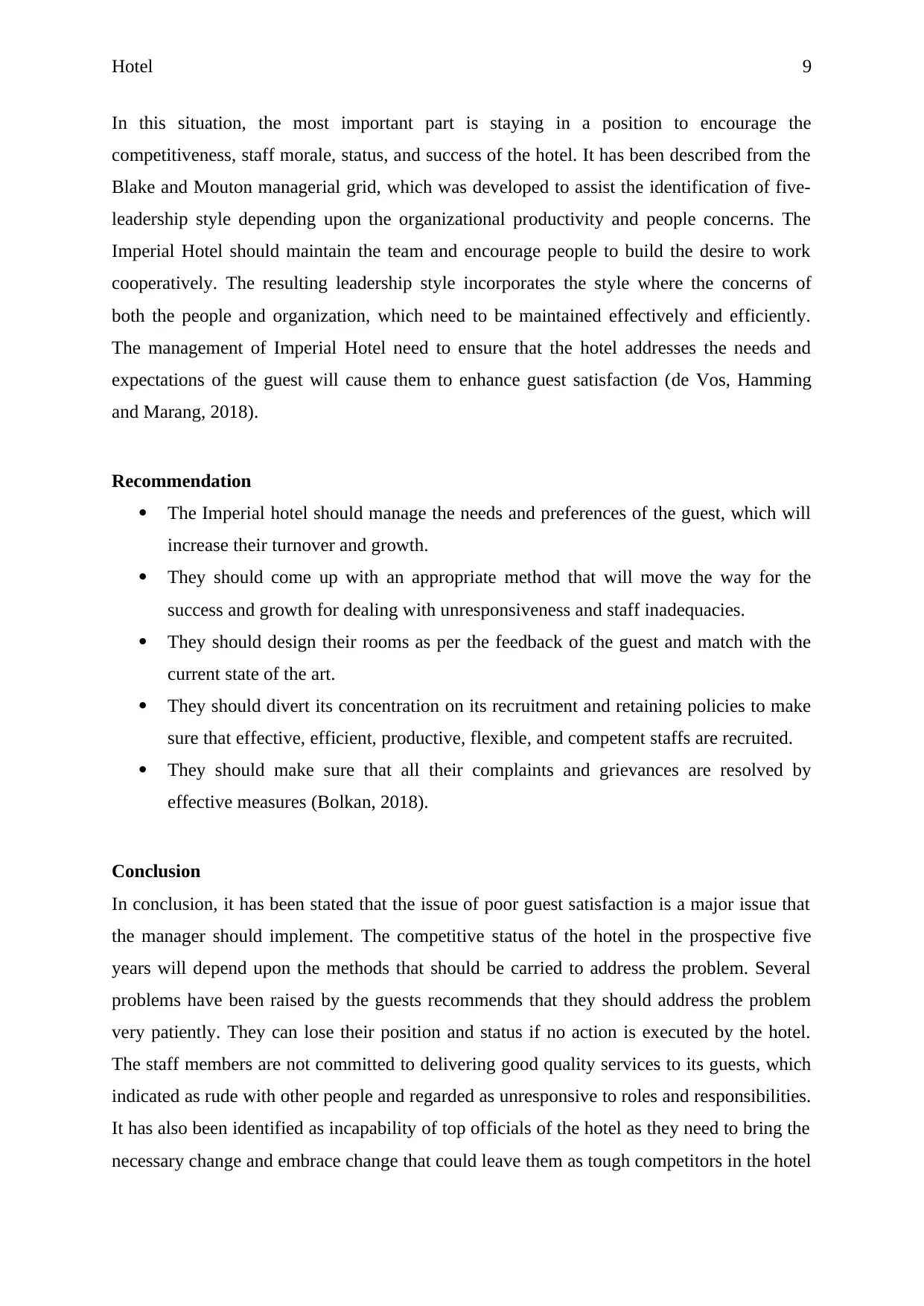
Hotel 9
In this situation, the most important part is staying in a position to encourage the
competitiveness, staff morale, status, and success of the hotel. It has been described from the
Blake and Mouton managerial grid, which was developed to assist the identification of five-
leadership style depending upon the organizational productivity and people concerns. The
Imperial Hotel should maintain the team and encourage people to build the desire to work
cooperatively. The resulting leadership style incorporates the style where the concerns of
both the people and organization, which need to be maintained effectively and efficiently.
The management of Imperial Hotel need to ensure that the hotel addresses the needs and
expectations of the guest will cause them to enhance guest satisfaction (de Vos, Hamming
and Marang, 2018).
Recommendation
The Imperial hotel should manage the needs and preferences of the guest, which will
increase their turnover and growth.
They should come up with an appropriate method that will move the way for the
success and growth for dealing with unresponsiveness and staff inadequacies.
They should design their rooms as per the feedback of the guest and match with the
current state of the art.
They should divert its concentration on its recruitment and retaining policies to make
sure that effective, efficient, productive, flexible, and competent staffs are recruited.
They should make sure that all their complaints and grievances are resolved by
effective measures (Bolkan, 2018).
Conclusion
In conclusion, it has been stated that the issue of poor guest satisfaction is a major issue that
the manager should implement. The competitive status of the hotel in the prospective five
years will depend upon the methods that should be carried to address the problem. Several
problems have been raised by the guests recommends that they should address the problem
very patiently. They can lose their position and status if no action is executed by the hotel.
The staff members are not committed to delivering good quality services to its guests, which
indicated as rude with other people and regarded as unresponsive to roles and responsibilities.
It has also been identified as incapability of top officials of the hotel as they need to bring the
necessary change and embrace change that could leave them as tough competitors in the hotel
In this situation, the most important part is staying in a position to encourage the
competitiveness, staff morale, status, and success of the hotel. It has been described from the
Blake and Mouton managerial grid, which was developed to assist the identification of five-
leadership style depending upon the organizational productivity and people concerns. The
Imperial Hotel should maintain the team and encourage people to build the desire to work
cooperatively. The resulting leadership style incorporates the style where the concerns of
both the people and organization, which need to be maintained effectively and efficiently.
The management of Imperial Hotel need to ensure that the hotel addresses the needs and
expectations of the guest will cause them to enhance guest satisfaction (de Vos, Hamming
and Marang, 2018).
Recommendation
The Imperial hotel should manage the needs and preferences of the guest, which will
increase their turnover and growth.
They should come up with an appropriate method that will move the way for the
success and growth for dealing with unresponsiveness and staff inadequacies.
They should design their rooms as per the feedback of the guest and match with the
current state of the art.
They should divert its concentration on its recruitment and retaining policies to make
sure that effective, efficient, productive, flexible, and competent staffs are recruited.
They should make sure that all their complaints and grievances are resolved by
effective measures (Bolkan, 2018).
Conclusion
In conclusion, it has been stated that the issue of poor guest satisfaction is a major issue that
the manager should implement. The competitive status of the hotel in the prospective five
years will depend upon the methods that should be carried to address the problem. Several
problems have been raised by the guests recommends that they should address the problem
very patiently. They can lose their position and status if no action is executed by the hotel.
The staff members are not committed to delivering good quality services to its guests, which
indicated as rude with other people and regarded as unresponsive to roles and responsibilities.
It has also been identified as incapability of top officials of the hotel as they need to bring the
necessary change and embrace change that could leave them as tough competitors in the hotel
Secure Best Marks with AI Grader
Need help grading? Try our AI Grader for instant feedback on your assignments.
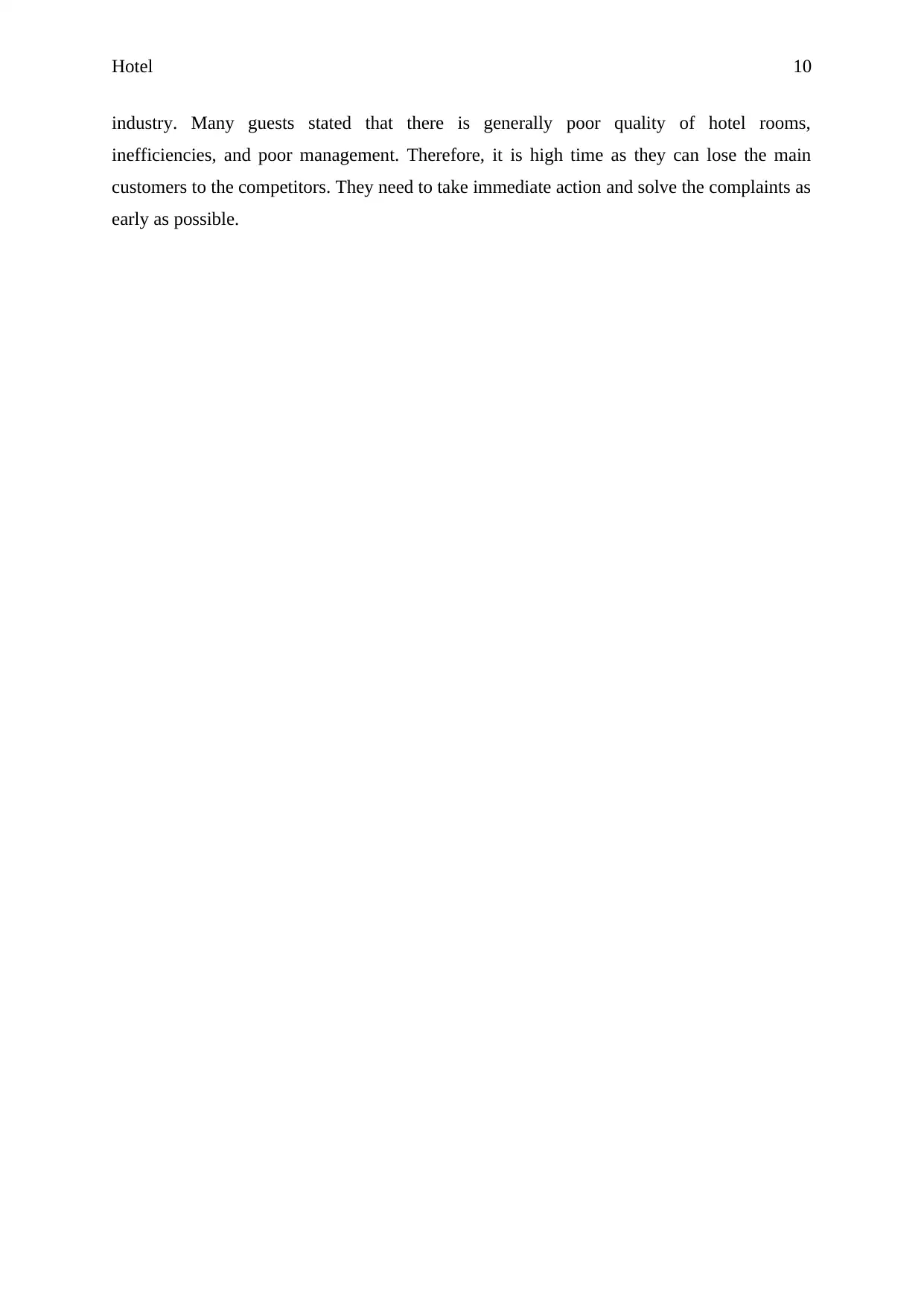
Hotel 10
industry. Many guests stated that there is generally poor quality of hotel rooms,
inefficiencies, and poor management. Therefore, it is high time as they can lose the main
customers to the competitors. They need to take immediate action and solve the complaints as
early as possible.
industry. Many guests stated that there is generally poor quality of hotel rooms,
inefficiencies, and poor management. Therefore, it is high time as they can lose the main
customers to the competitors. They need to take immediate action and solve the complaints as
early as possible.
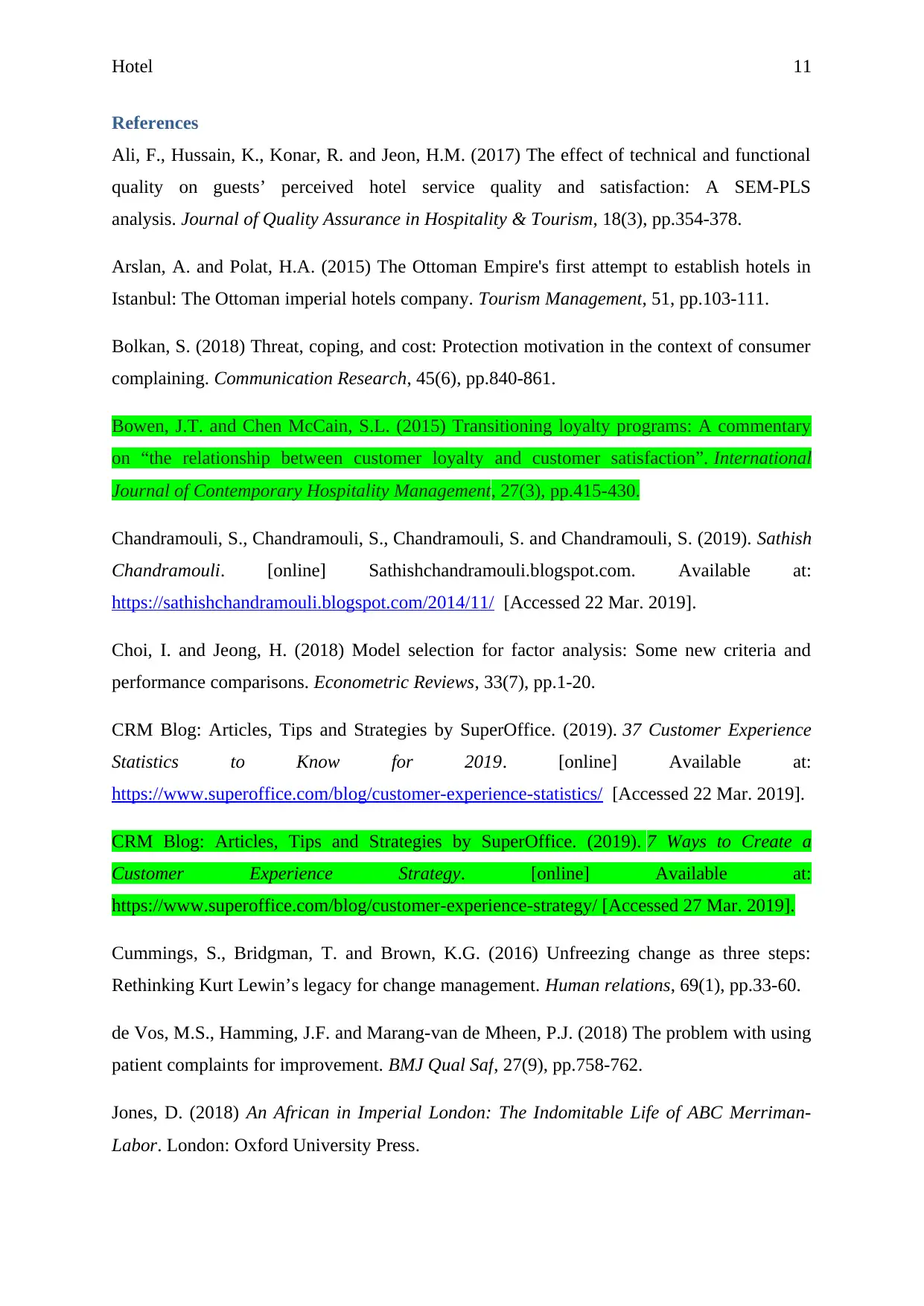
Hotel 11
References
Ali, F., Hussain, K., Konar, R. and Jeon, H.M. (2017) The effect of technical and functional
quality on guests’ perceived hotel service quality and satisfaction: A SEM-PLS
analysis. Journal of Quality Assurance in Hospitality & Tourism, 18(3), pp.354-378.
Arslan, A. and Polat, H.A. (2015) The Ottoman Empire's first attempt to establish hotels in
Istanbul: The Ottoman imperial hotels company. Tourism Management, 51, pp.103-111.
Bolkan, S. (2018) Threat, coping, and cost: Protection motivation in the context of consumer
complaining. Communication Research, 45(6), pp.840-861.
Bowen, J.T. and Chen McCain, S.L. (2015) Transitioning loyalty programs: A commentary
on “the relationship between customer loyalty and customer satisfaction”. International
Journal of Contemporary Hospitality Management, 27(3), pp.415-430.
Chandramouli, S., Chandramouli, S., Chandramouli, S. and Chandramouli, S. (2019). Sathish
Chandramouli. [online] Sathishchandramouli.blogspot.com. Available at:
https://sathishchandramouli.blogspot.com/2014/11/ [Accessed 22 Mar. 2019].
Choi, I. and Jeong, H. (2018) Model selection for factor analysis: Some new criteria and
performance comparisons. Econometric Reviews, 33(7), pp.1-20.
CRM Blog: Articles, Tips and Strategies by SuperOffice. (2019). 37 Customer Experience
Statistics to Know for 2019. [online] Available at:
https://www.superoffice.com/blog/customer-experience-statistics/ [Accessed 22 Mar. 2019].
CRM Blog: Articles, Tips and Strategies by SuperOffice. (2019). 7 Ways to Create a
Customer Experience Strategy. [online] Available at:
https://www.superoffice.com/blog/customer-experience-strategy/ [Accessed 27 Mar. 2019].
Cummings, S., Bridgman, T. and Brown, K.G. (2016) Unfreezing change as three steps:
Rethinking Kurt Lewin’s legacy for change management. Human relations, 69(1), pp.33-60.
de Vos, M.S., Hamming, J.F. and Marang-van de Mheen, P.J. (2018) The problem with using
patient complaints for improvement. BMJ Qual Saf, 27(9), pp.758-762.
Jones, D. (2018) An African in Imperial London: The Indomitable Life of ABC Merriman-
Labor. London: Oxford University Press.
References
Ali, F., Hussain, K., Konar, R. and Jeon, H.M. (2017) The effect of technical and functional
quality on guests’ perceived hotel service quality and satisfaction: A SEM-PLS
analysis. Journal of Quality Assurance in Hospitality & Tourism, 18(3), pp.354-378.
Arslan, A. and Polat, H.A. (2015) The Ottoman Empire's first attempt to establish hotels in
Istanbul: The Ottoman imperial hotels company. Tourism Management, 51, pp.103-111.
Bolkan, S. (2018) Threat, coping, and cost: Protection motivation in the context of consumer
complaining. Communication Research, 45(6), pp.840-861.
Bowen, J.T. and Chen McCain, S.L. (2015) Transitioning loyalty programs: A commentary
on “the relationship between customer loyalty and customer satisfaction”. International
Journal of Contemporary Hospitality Management, 27(3), pp.415-430.
Chandramouli, S., Chandramouli, S., Chandramouli, S. and Chandramouli, S. (2019). Sathish
Chandramouli. [online] Sathishchandramouli.blogspot.com. Available at:
https://sathishchandramouli.blogspot.com/2014/11/ [Accessed 22 Mar. 2019].
Choi, I. and Jeong, H. (2018) Model selection for factor analysis: Some new criteria and
performance comparisons. Econometric Reviews, 33(7), pp.1-20.
CRM Blog: Articles, Tips and Strategies by SuperOffice. (2019). 37 Customer Experience
Statistics to Know for 2019. [online] Available at:
https://www.superoffice.com/blog/customer-experience-statistics/ [Accessed 22 Mar. 2019].
CRM Blog: Articles, Tips and Strategies by SuperOffice. (2019). 7 Ways to Create a
Customer Experience Strategy. [online] Available at:
https://www.superoffice.com/blog/customer-experience-strategy/ [Accessed 27 Mar. 2019].
Cummings, S., Bridgman, T. and Brown, K.G. (2016) Unfreezing change as three steps:
Rethinking Kurt Lewin’s legacy for change management. Human relations, 69(1), pp.33-60.
de Vos, M.S., Hamming, J.F. and Marang-van de Mheen, P.J. (2018) The problem with using
patient complaints for improvement. BMJ Qual Saf, 27(9), pp.758-762.
Jones, D. (2018) An African in Imperial London: The Indomitable Life of ABC Merriman-
Labor. London: Oxford University Press.
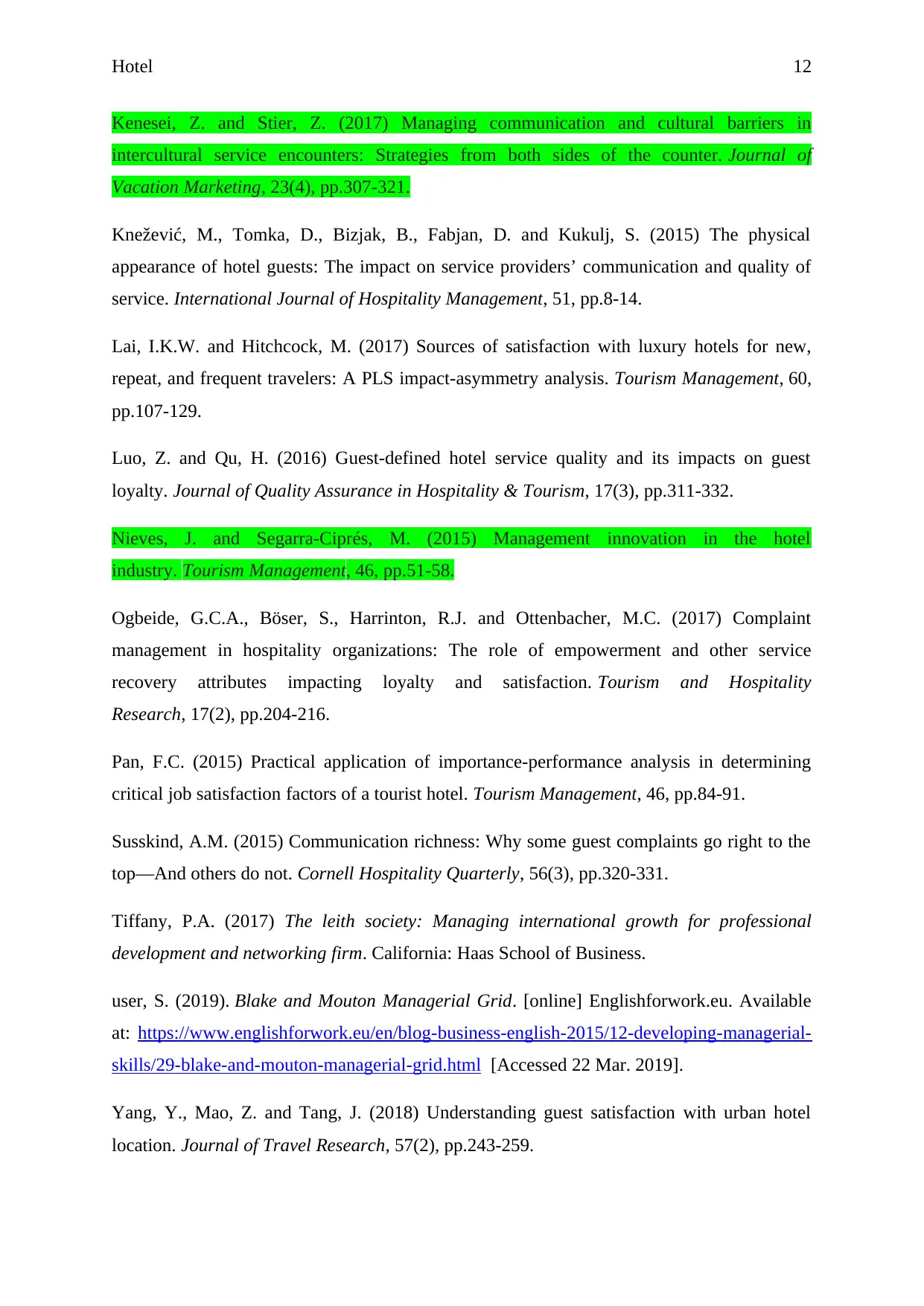
Hotel 12
Kenesei, Z. and Stier, Z. (2017) Managing communication and cultural barriers in
intercultural service encounters: Strategies from both sides of the counter. Journal of
Vacation Marketing, 23(4), pp.307-321.
Knežević, M., Tomka, D., Bizjak, B., Fabjan, D. and Kukulj, S. (2015) The physical
appearance of hotel guests: The impact on service providers’ communication and quality of
service. International Journal of Hospitality Management, 51, pp.8-14.
Lai, I.K.W. and Hitchcock, M. (2017) Sources of satisfaction with luxury hotels for new,
repeat, and frequent travelers: A PLS impact-asymmetry analysis. Tourism Management, 60,
pp.107-129.
Luo, Z. and Qu, H. (2016) Guest-defined hotel service quality and its impacts on guest
loyalty. Journal of Quality Assurance in Hospitality & Tourism, 17(3), pp.311-332.
Nieves, J. and Segarra-Ciprés, M. (2015) Management innovation in the hotel
industry. Tourism Management, 46, pp.51-58.
Ogbeide, G.C.A., Böser, S., Harrinton, R.J. and Ottenbacher, M.C. (2017) Complaint
management in hospitality organizations: The role of empowerment and other service
recovery attributes impacting loyalty and satisfaction. Tourism and Hospitality
Research, 17(2), pp.204-216.
Pan, F.C. (2015) Practical application of importance-performance analysis in determining
critical job satisfaction factors of a tourist hotel. Tourism Management, 46, pp.84-91.
Susskind, A.M. (2015) Communication richness: Why some guest complaints go right to the
top—And others do not. Cornell Hospitality Quarterly, 56(3), pp.320-331.
Tiffany, P.A. (2017) The leith society: Managing international growth for professional
development and networking firm. California: Haas School of Business.
user, S. (2019). Blake and Mouton Managerial Grid. [online] Englishforwork.eu. Available
at: https://www.englishforwork.eu/en/blog-business-english-2015/12-developing-managerial-
skills/29-blake-and-mouton-managerial-grid.html [Accessed 22 Mar. 2019].
Yang, Y., Mao, Z. and Tang, J. (2018) Understanding guest satisfaction with urban hotel
location. Journal of Travel Research, 57(2), pp.243-259.
Kenesei, Z. and Stier, Z. (2017) Managing communication and cultural barriers in
intercultural service encounters: Strategies from both sides of the counter. Journal of
Vacation Marketing, 23(4), pp.307-321.
Knežević, M., Tomka, D., Bizjak, B., Fabjan, D. and Kukulj, S. (2015) The physical
appearance of hotel guests: The impact on service providers’ communication and quality of
service. International Journal of Hospitality Management, 51, pp.8-14.
Lai, I.K.W. and Hitchcock, M. (2017) Sources of satisfaction with luxury hotels for new,
repeat, and frequent travelers: A PLS impact-asymmetry analysis. Tourism Management, 60,
pp.107-129.
Luo, Z. and Qu, H. (2016) Guest-defined hotel service quality and its impacts on guest
loyalty. Journal of Quality Assurance in Hospitality & Tourism, 17(3), pp.311-332.
Nieves, J. and Segarra-Ciprés, M. (2015) Management innovation in the hotel
industry. Tourism Management, 46, pp.51-58.
Ogbeide, G.C.A., Böser, S., Harrinton, R.J. and Ottenbacher, M.C. (2017) Complaint
management in hospitality organizations: The role of empowerment and other service
recovery attributes impacting loyalty and satisfaction. Tourism and Hospitality
Research, 17(2), pp.204-216.
Pan, F.C. (2015) Practical application of importance-performance analysis in determining
critical job satisfaction factors of a tourist hotel. Tourism Management, 46, pp.84-91.
Susskind, A.M. (2015) Communication richness: Why some guest complaints go right to the
top—And others do not. Cornell Hospitality Quarterly, 56(3), pp.320-331.
Tiffany, P.A. (2017) The leith society: Managing international growth for professional
development and networking firm. California: Haas School of Business.
user, S. (2019). Blake and Mouton Managerial Grid. [online] Englishforwork.eu. Available
at: https://www.englishforwork.eu/en/blog-business-english-2015/12-developing-managerial-
skills/29-blake-and-mouton-managerial-grid.html [Accessed 22 Mar. 2019].
Yang, Y., Mao, Z. and Tang, J. (2018) Understanding guest satisfaction with urban hotel
location. Journal of Travel Research, 57(2), pp.243-259.
Paraphrase This Document
Need a fresh take? Get an instant paraphrase of this document with our AI Paraphraser
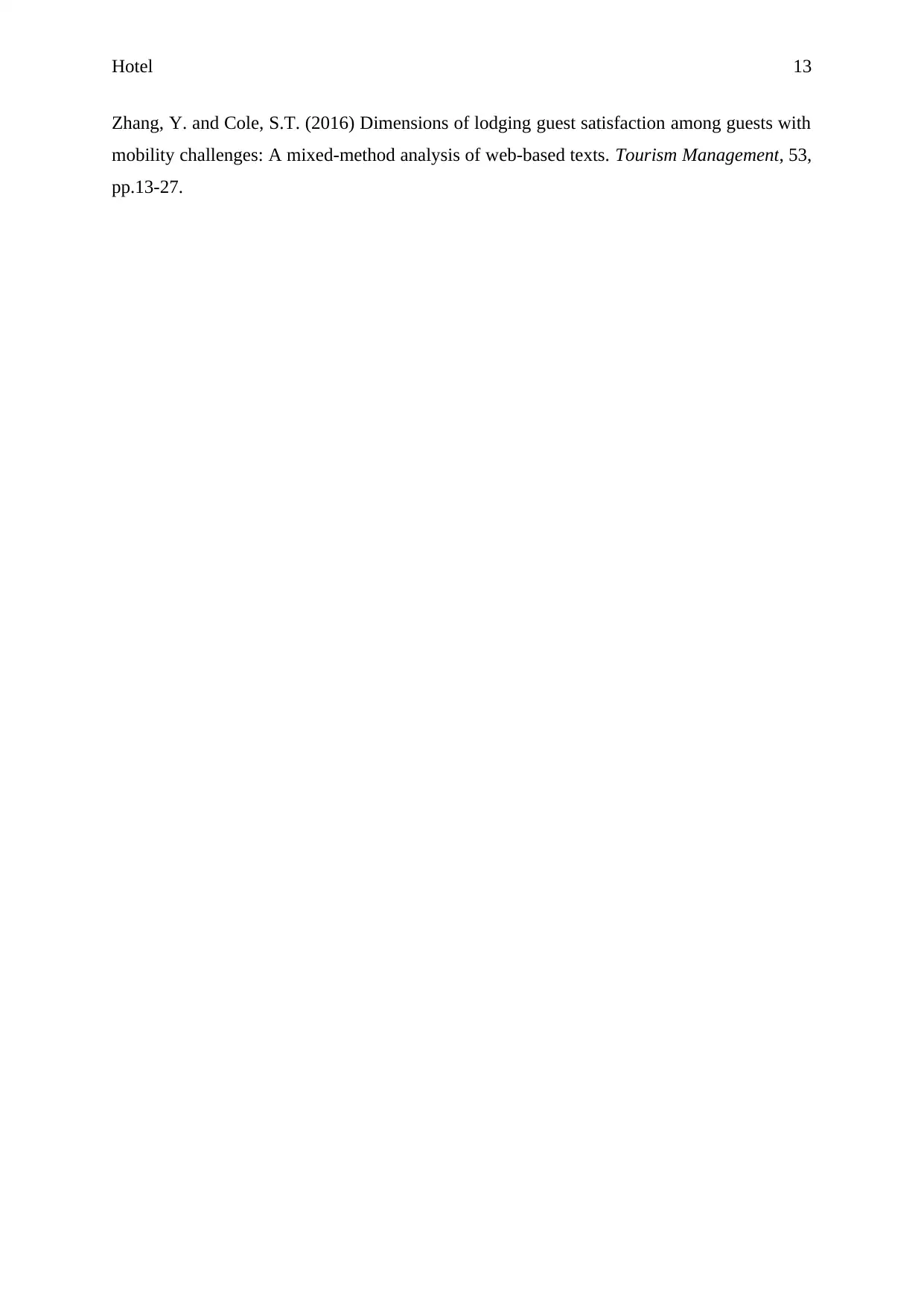
Hotel 13
Zhang, Y. and Cole, S.T. (2016) Dimensions of lodging guest satisfaction among guests with
mobility challenges: A mixed-method analysis of web-based texts. Tourism Management, 53,
pp.13-27.
Zhang, Y. and Cole, S.T. (2016) Dimensions of lodging guest satisfaction among guests with
mobility challenges: A mixed-method analysis of web-based texts. Tourism Management, 53,
pp.13-27.
1 out of 14
Related Documents
Your All-in-One AI-Powered Toolkit for Academic Success.
+13062052269
info@desklib.com
Available 24*7 on WhatsApp / Email
![[object Object]](/_next/static/media/star-bottom.7253800d.svg)
Unlock your academic potential
© 2024 | Zucol Services PVT LTD | All rights reserved.





